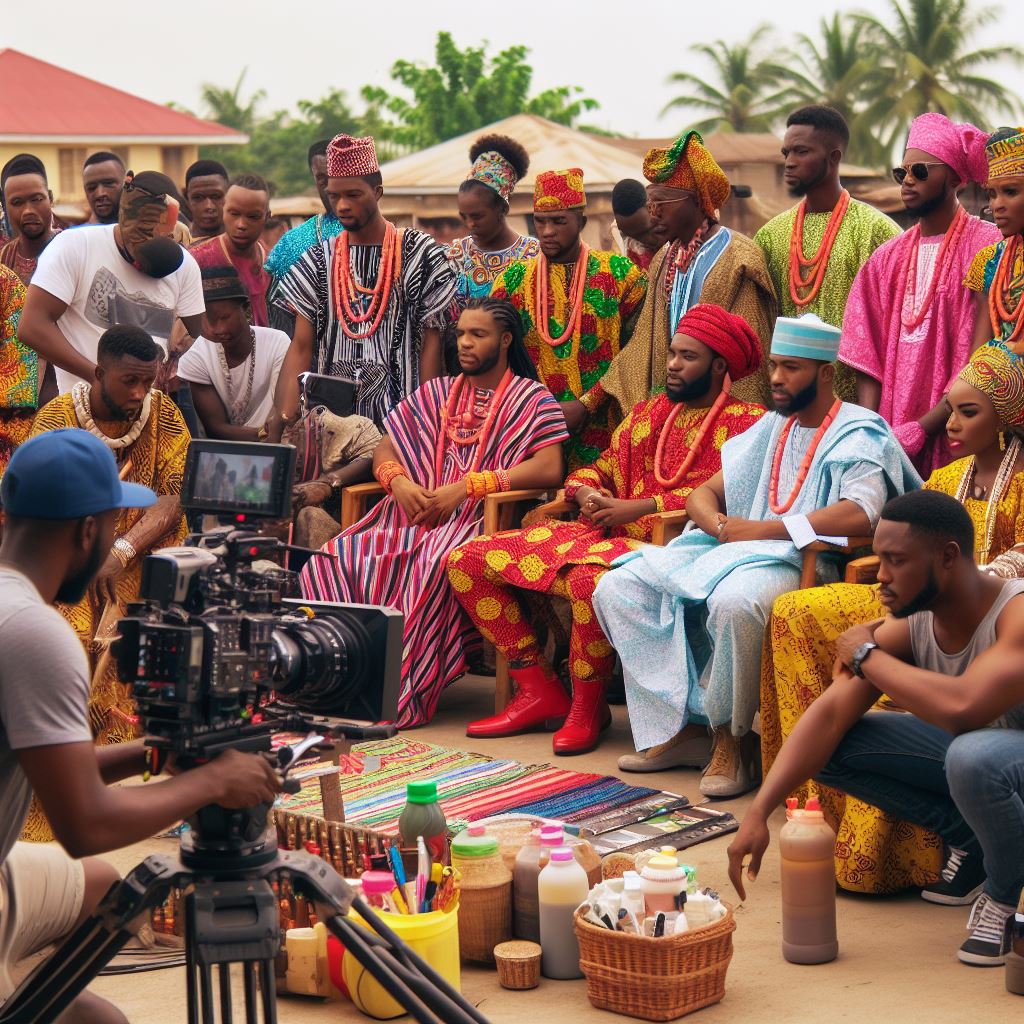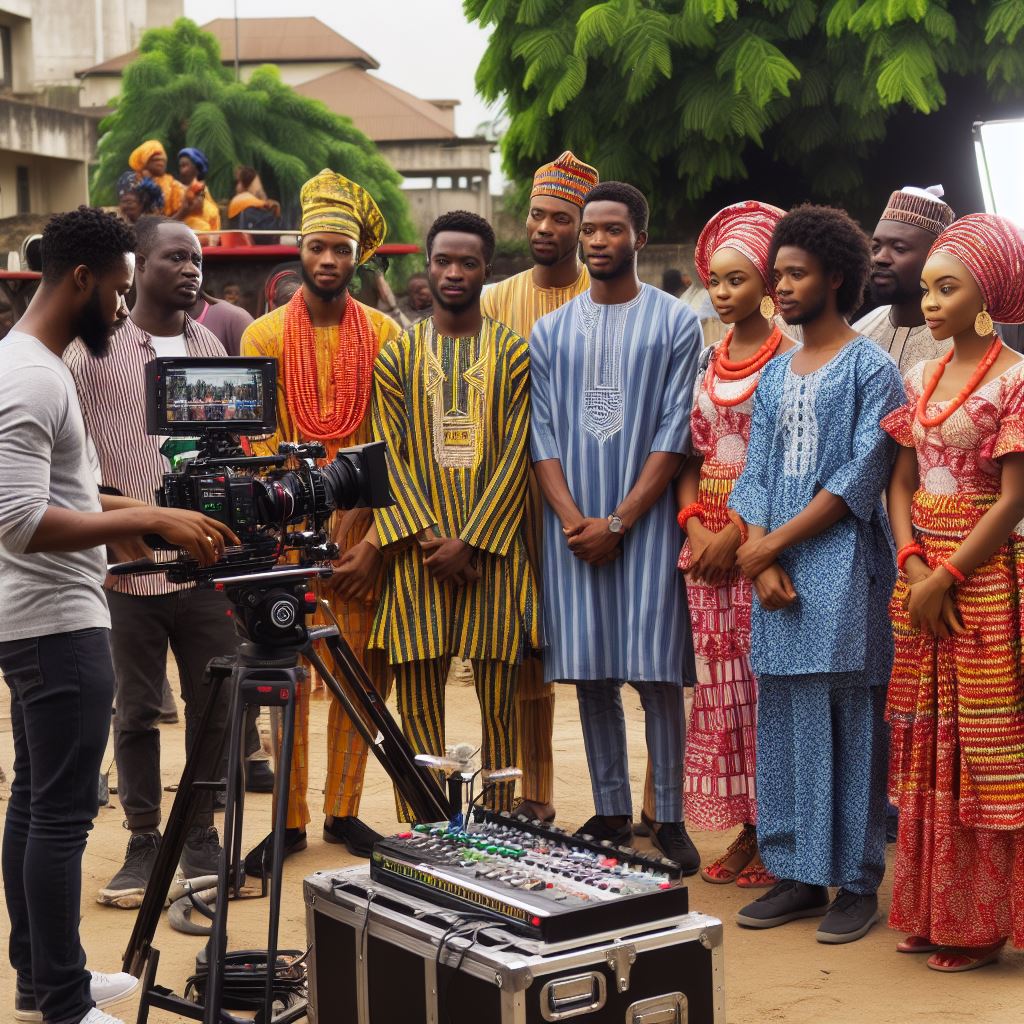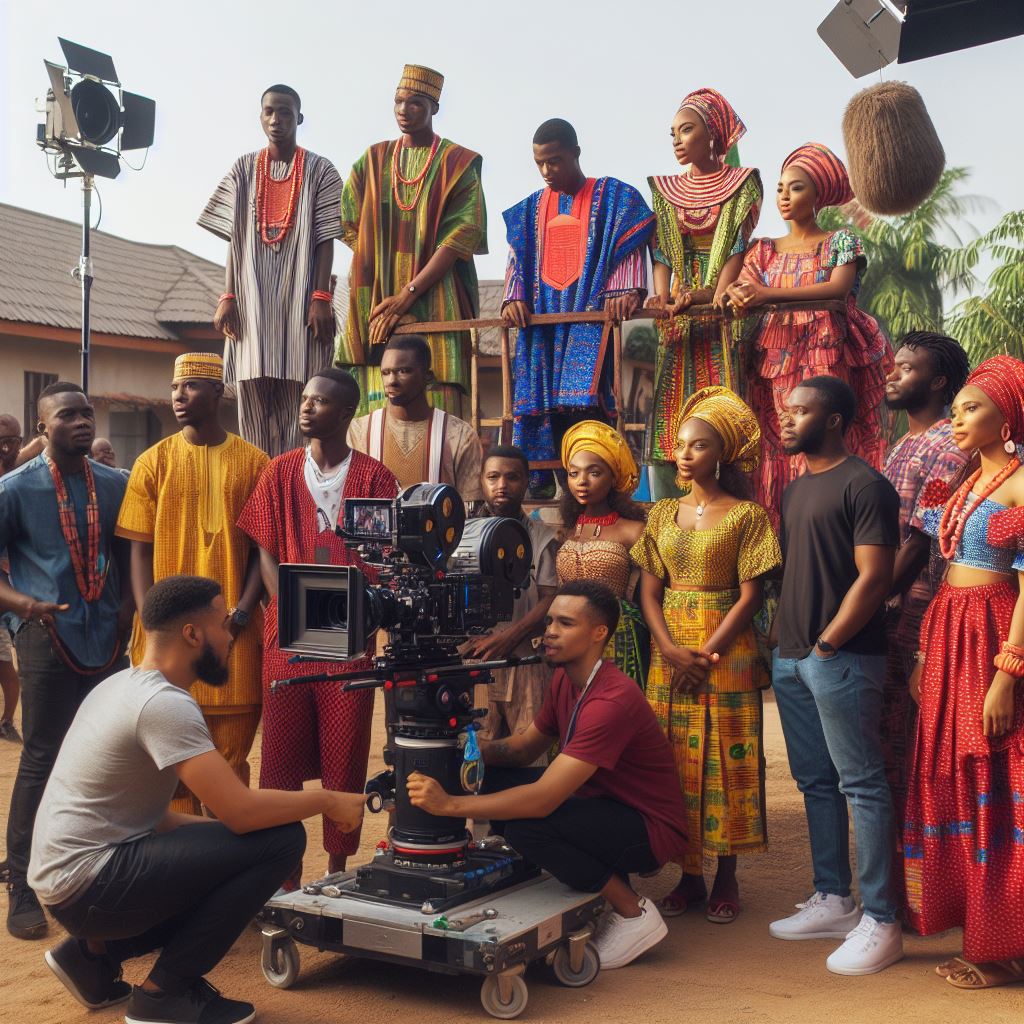Introduction
Nollywood, Nigeria’s cinematic powerhouse, astounds with its rapid growth and global impact. Emerging from humble beginnings, Nollywood now stands as Africa’s largest film industry.
Rooted in the 1990s, Nollywood burgeoned into a cinematic force, producing thousands of films annually. Its low-budget productions captivate audiences worldwide, earning acclaim for their unique storytelling.
Nollywood mirrors Nigeria’s diverse cultures, portraying traditions, languages, and societal norms authentically. Through its films, Nollywood fosters cultural pride and unity, celebrating Nigeria’s rich heritage.
Beyond cultural influence, Nollywood fuels Nigeria’s economy, generating billions in revenue annually. Its thriving ecosystem provides employment opportunities and stimulates ancillary industries, including tourism and fashion.
Nollywood amplifies Nigerian voices, showcasing stories often overlooked by mainstream media. Its portrayal of societal issues sparks conversations, driving social change and promoting inclusivity.
Global Reach and Influence
With its captivating narratives and relatable characters, Nollywood transcends borders, captivating audiences across Africa and beyond. Its influence extends to diaspora communities, connecting Nigerians worldwide through shared cultural experiences.
Despite its success, Nollywood faces challenges, including piracy and infrastructure limitations. However, ongoing investments in technology and training pave the way for sustainable growth, fostering a vibrant ecosystem for filmmakers.
Nollywood serves as a platform for female storytellers, empowering women both in front of and behind the camera. Through diverse roles and narratives, Nollywood challenges gender stereotypes and promotes gender equality.
Nollywood’s reach extends beyond entertainment, serving as an educational tool and catalyst for social change. Its films address pressing issues such as education, healthcare, and governance, raising awareness and inspiring action.
In a nutshell, Nollywood’s ascent from grassroots beginnings to global prominence underscores its significance in shaping Nigerian culture and economy.
With its captivating storytelling and economic contributions, Nollywood continues to inspire and unite audiences worldwide.
Exploring Nollywood: Nigeria’s Booming Film Industry
History of Nollywood
In the early 1990s, Nollywood emerged from Nigeria’s vibrant cultural landscape.
Entrepreneurs saw potential in local storytelling through film.
Driven by passion and limited resources, pioneers produced low-budget, high-impact movies.
These films resonated with Nigerian audiences, reflecting their realities and aspirations.
The term “Nollywood” coined due to similarities with Hollywood and Bollywood.
Origins of Nollywood
Nollywood’s roots trace back to indigenous theatrical traditions.
Igbo traveling theatre and Yoruba traveling theatre influenced early filmmakers.
The transition from stage to screen marked a pivotal moment.
The advent of video technology revolutionized film production.
Affordable VHS tapes enabled widespread distribution and accessibility.
Growth and Development
Nollywood experienced exponential growth fueled by demand and innovation.
Filmmakers embraced digital technology, enhancing production quality.
The industry’s decentralized nature allowed for diverse storytelling and experimentation.
Nollywood’s success attracted international attention, fostering collaborations and partnerships.
Government support and private investments further propelled its expansion.
Impact on the Global Film Market
Nollywood’s influence transcends borders, captivating audiences worldwide.
Its distinctive storytelling style offers fresh perspectives on African culture.
The industry challenges Western-dominated narratives, promoting cultural diversity.
Nollywood’s success inspires filmmakers in other developing regions.
Streaming platforms amplify its reach, introducing Nollywood to new audiences.
In review, Nollywood’s journey from humble beginnings to global prominence is remarkable.
Its impact extends beyond entertainment, shaping perceptions and narratives.
As the industry continues to evolve, its cultural significance remains undeniable.
Nollywood’s success story serves as a testament to the power of creativity and resilience.
In a rapidly changing world, Nollywood stands as a beacon of African cinema.
Read: Communication Arts: Balancing Theory and Practice
Key players in Nollywood
Prominent Actors, Directors, and Producers in the Industry
Nollywood, Nigeria’s thriving film industry, boasts a plethora of talented individuals who have contributed immensely to its success.
From actors who bring characters to life on-screen to directors who craft compelling narratives, these key players play a crucial role in shaping the industry.
Some of the most prominent actors in Nollywood include veterans like Genevieve Nnaji, Rita Dominic, and Ramsey Nouah, who have established themselves as household names both within and outside Nigeria.
Their stellar performances have garnered widespread acclaim and helped elevate Nollywood’s reputation on the global stage.
On the directorial front, filmmakers like Kunle Afolayan, Kemi Adetiba, and Niyi Akinmolayan have made significant contributions to the industry with their innovative storytelling and technical finesse.
Their ability to capture the essence of Nigerian culture while also appealing to international audiences has been instrumental in Nollywood’s growth and recognition.
Producers such as Mo Abudu, EbonyLife Films, and FilmOne Entertainment have been instrumental in driving the industry’s commercial success by funding and packaging high-quality productions that resonate with viewers.
Their strategic vision and business acumen have helped Nollywood evolve into a competitive force in the global entertainment landscape.
Influence of Key Players on the Success of Nollywood
The influence of key players in Nollywood cannot be overstated when it comes to the industry’s success and growth over the years.
These individuals bring a wealth of talent, experience, and expertise to the table, shaping the creative direction and commercial viability of Nollywood productions.
Actors serve as the face of Nollywood, drawing audiences to theaters with their star power and compelling performances.
Their ability to embody diverse characters and emotions resonates with viewers, establishing a strong connection that drives box office success and critical acclaim.
Directors play a crucial role in translating scripts into cinematic experiences, bringing narratives to life with visual flair and storytelling prowess.
Their artistic vision and technical skill set the tone for a film’s aesthetic and thematic impact, shaping audience perceptions and critical reception.
Producers are the backbone of Nollywood, providing the necessary resources and support to bring projects to fruition.
Their financial investment, creative input, and strategic planning are essential for the industry’s sustainability and growth, ensuring that Nollywood remains a vibrant and thriving ecosystem for filmmakers and audiences alike.
Examples of Successful Projects and Collaborations within Nollywood
Nollywood has seen a rise in successful projects and collaborations that have propelled the industry to new heights and garnered international acclaim.
From blockbuster films to innovative series, these endeavors showcase the diversity and creativity of Nigerian cinema.
One notable example is “The Wedding Party,” a romantic comedy directed by Kemi Adetiba and produced by Mo Abudu, which became a breakout hit both in Nigeria and internationally.
The film’s stellar cast, engaging storyline, and high production values made it a cultural phenomenon and a box office success, setting a new standard for Nollywood productions.
Another standout project is “King of Boys,” a crime thriller directed by Kemi Adetiba and produced by Kemi Adetiba and Remi Adamson Tinubu.
The film’s gripping narrative, powerful performances, and social commentary resonated with audiences and critics alike, earning accolades and sparking conversations about the complexities of power and redemption in Nigerian society.
Collaborations between actors, directors, and producers have also contributed to Nollywood’s success, with teams coming together to create compelling stories that showcase the richness and diversity of Nigerian culture.
By pooling their talents and resources, these collaborations have generated innovative and groundbreaking projects that have captivated audiences and expanded Nollywood’s global reach.
In fact, key players in Nollywood – including actors, directors, and producers – play a vital role in shaping the industry’s creative direction, commercial viability, and global impact.
Their contributions and collaborations have been instrumental in driving Nollywood’s success and cementing its status as a powerhouse in African cinema.
Read: How to Apply for Communication Arts Programs
Diversity in Nollywood: A Cultural Kaleidoscope
In Nollywood, diversity isn’t just a buzzword; it’s the very essence of its storytelling fabric.
Representation Beyond Borders
Nollywood prides itself on its rich tapestry of ethnicities, languages, and cultures.
Each film serves as a window into Nigeria’s diverse landscape, showcasing its myriad traditions.
From the Hausa in the north to the Yoruba in the west and Igbo in the east, Nollywood embraces all.
A Linguistic Mosaic
Languages intertwine in Nollywood, reflecting Nigeria’s linguistic diversity.
Films seamlessly weave English with local languages, making them accessible to a broader audience.
This linguistic inclusivity not only preserves indigenous languages but also fosters cultural pride.
Celebrating Cultural Heritage
Nollywood isn’t just about entertainment; it’s a celebration of cultural heritage.
Themes ranging from folklore to modern societal issues underscore the richness of Nigerian culture.
Through storytelling, Nollywood preserves traditions, fostering a sense of identity among Nigerians.
Transform Your Career with Expert Guidance
Get personalized mentorship consulting that’s tailored to your unique path. Our expert advice is actionable and exclusive.
Get StartedGenre-Bending Narratives
Nollywood isn’t confined to a single genre; it’s a melting pot of storytelling styles.
From gripping dramas to rib-tickling comedies and heart-wrenching romances, it offers something for everyone.
This diverse array of genres reflects the multifaceted nature of Nigerian society.
Breaking Stereotypes
Nollywood challenges stereotypes by portraying complex, multidimensional characters.
Gone are the days of one-dimensional portrayals; Nollywood characters reflect the intricacies of real life.
By humanizing diverse experiences, Nollywood bridges cultural divides and fosters empathy.
Promoting Social Inclusion
Nollywood serves as a catalyst for social change, advocating for inclusivity and acceptance.
Films tackle taboo topics, sparking conversations on gender equality, LGBTQ+ rights, and more.
Through its narratives, Nollywood fosters a more inclusive and tolerant society.
Empowering Underrepresented Voices
Nollywood provides a platform for underrepresented voices to be heard.
Emerging filmmakers bring fresh perspectives, enriching the industry with diverse narratives.
This democratization of storytelling amplifies marginalized voices, promoting societal change.
Basically, Nollywood’s commitment to diversity is evident in every frame.
By embracing Nigeria’s rich cultural heritage, it promotes unity in diversity.
As a powerful tool for social change, Nollywood continues to break barriers and foster inclusivity.
In the vibrant tapestry of Nollywood, diversity isn’t just celebrated—it’s the very essence of its being.
Read: Introduction to African and Asian Studies in Nigeria

Challenges Facing Nollywood
Piracy and Copyright Issues
Piracy plagues Nollywood, undermining profits and discouraging creativity among filmmakers.
Copyright infringement runs rampant, with unauthorized distribution stifling revenue streams and devaluing original content.
Nollywood struggles to combat piracy due to lax enforcement of intellectual property laws.
The widespread availability of pirated films erodes the industry’s credibility and hinders its global expansion.
Lack of Funding and Infrastructure
Limited financial resources hinder the quality and scale of Nollywood productions.
Many filmmakers face challenges securing financing for their projects, constraining creative freedom.
Inadequate infrastructure, including outdated equipment and facilities, impedes the filmmaking process.
Without proper funding and infrastructure, Nollywood struggles to compete on an international level.
Steps Being Taken to Address These Challenges
Anti-Piracy Measures
Nollywood stakeholders are collaborating with law enforcement agencies to crack down on piracy networks.
Increased awareness campaigns aim to educate the public about the detrimental effects of piracy.
Technology-driven solutions, such as digital rights management systems, are being implemented to curb illegal distribution.
Stricter enforcement of copyright laws and stiffer penalties for offenders are being advocated for.
Investment and Development Initiatives
Government and private sector initiatives are providing funding and support for aspiring filmmakers.
Film grants and subsidies are being made available to encourage the production of high-quality content.
Investments in infrastructure upgrades, such as modern studios and post-production facilities, are underway.
Partnerships with international investors and production companies are facilitating access to capital and expertise.
Capacity Building and Training Programs
Nollywood associations and academies are offering training programs to enhance the skills of filmmakers.
Workshops and mentorship opportunities are empowering aspiring talents and fostering industry growth.
Collaborations with educational institutions are providing specialized training in various aspects of filmmaking.
By investing in talent development, Nollywood aims to elevate the standards of its productions and compete globally.
Overall, Despite facing significant challenges, Nollywood remains resilient and continues to thrive.
Efforts to combat piracy, improve funding and infrastructure, and invest in talent are underway.
With sustained commitment and collaboration, Nollywood is poised to sustain its growth trajectory and solidify its position as a global film industry powerhouse.
Read: Famous Nigerian Alumni of Communication Arts Programs
International Recognition and Collaborations
Nollywood, Nigeria’s burgeoning film industry, has garnered significant international recognition in recent years. Its impact on the global film landscape is undeniable, as it continues to captivate audiences worldwide with its unique storytelling and cultural richness.
Nollywood’s Impact on the Global Film Industry
With its prolific output and diverse narratives, Nollywood has emerged as a major player in the global film industry.
Its movies, often characterized by dramatic plots, vibrant aesthetics, and compelling performances, have found audiences far beyond the shores of Nigeria.
Nollywood’s influence extends beyond entertainment, serving as a cultural ambassador for Nigeria and Africa as a whole.
Through its films, it showcases the continent’s rich heritage, traditions, and contemporary issues, fostering greater understanding and appreciation among international audiences.
Collaborations Between Nollywood and Hollywood
Collaborations between Nollywood and Hollywood have become increasingly common, reflecting the growing recognition of Nigerian talent and storytelling prowess.
These partnerships bridge continents, merging creative forces to produce groundbreaking cinema that resonates globally.
Hollywood’s interest in Nollywood stems from its innovative storytelling techniques and vast market potential.
By collaborating with Nigerian filmmakers and actors, Hollywood gains access to fresh perspectives and untapped narratives, enriching its own cinematic landscape.
Conversely, Nollywood benefits from these collaborations by leveraging Hollywood’s resources, expertise, and global reach.
Such partnerships facilitate the exchange of ideas, skills, and technologies, elevating the quality and visibility of Nigerian cinema on the international stage.
Recognition of Nigerian Filmmakers and Actors on the International Stage
Nigerian filmmakers and actors have received increasing recognition and accolades on the international stage, affirming Nollywood’s growing influence and contribution to world cinema.
From prestigious film festivals to renowned award ceremonies, Nigerian talents are making their mark.
Notable filmmakers like Kunle Afolayan, Genevieve Nnaji, and Niyi Akinmolayan have garnered acclaim for their work, earning accolades and nominations from esteemed institutions such as the Oscars, Cannes Film Festival, and Toronto International Film Festival.
Moreover, Nigerian actors such as Chiwetel Ejiofor, David Oyelowo, and Lupita Nyong’o have achieved international renown, starring in blockbuster films and earning critical acclaim for their performances.
Their success not only showcases the talent pool within Nollywood but also challenges stereotypes and promotes diversity in global cinema.
In short, Nollywood’s international recognition and collaborations underscore its transformative impact on the global film industry.
Through partnerships with Hollywood and the recognition of Nigerian filmmakers and actors on the international stage, Nollywood continues to inspire, entertain, and enrich audiences worldwide.
Read: Digital Media Trends in Communication Arts
Social Impact of Nollywood
Nollywood, Nigeria’s vibrant film industry, wields substantial influence on society. It shapes perceptions, norms, and values through storytelling. From urban centers to remote villages, Nollywood’s reach is unparalleled.
Influence on Nigerian Popular Culture
Nollywood is the heartbeat of Nigerian popular culture. Its films resonate deeply with audiences, mirroring their realities and aspirations. Stars like Genevieve Nnaji and Omotola Jalade-Ekeinde have attained iconic status, embodying the essence of Nigerian identity.
Shaping Societal Norms and Values
Nollywood serves as a cultural mirror, reflecting and sometimes challenging societal norms. Its narratives often confront taboo subjects such as corruption, gender inequality, and tribal tensions.
Through compelling storytelling, it prompts critical dialogue and fosters social change.
Addressing Social Issues
Nollywood’s strength lies in its ability to confront pressing social issues. Films tackle topics like poverty, education, healthcare, and political corruption.
By portraying these realities on screen, Nollywood catalyzes awareness and advocacy, driving conversations that lead to tangible action.
In “Half of a Yellow Sun,” based on Chimamanda Ngozi Adichie’s novel, Nollywood vividly depicts the Biafran War’s impact on families and communities.
The film not only educates younger generations about a pivotal moment in Nigerian history but also underscores the enduring scars of conflict.
In “October 1,” directed by Kunle Afolayan, Nollywood delves into the complexities of identity and nationhood against the backdrop of Nigeria’s struggle for independence.
Through its nuanced portrayal of historical events, the film fosters reflection on Nigeria’s past, present, and future.
Nollywood’s impact extends beyond entertainment; it’s a catalyst for social change. Through partnerships with NGOs and government agencies, filmmakers leverage their influence to address pressing issues.
Initiatives like the “Nollywood for Clean Water” campaign highlight the industry’s commitment to social responsibility.
Despite its immense reach and influence, Nollywood faces challenges. Piracy, limited funding, and infrastructure constraints hinder its growth potential. However, the industry’s resilience and innovative spirit continue to drive it forward.
As Nollywood evolves, its impact on Nigerian society remains profound. Through captivating storytelling and a commitment to addressing social issues, it continues to shape cultural norms, challenge perceptions, and inspire change.
Conclusion
Nollywood, Nigeria’s vibrant film industry, profoundly shapes its cultural and economic spheres. It’s a powerhouse of creativity and innovation, influencing not just Nigeria but the entire African continent and beyond.
Significance of Nollywood
Nollywood isn’t just about entertainment; it’s a reflection of Nigerian culture, showcasing its diversity, traditions, and contemporary issues.
Through its films, Nollywood serves as a platform for cultural preservation and expression, bridging generations and preserving heritage.
Economically, Nollywood is a formidable force, contributing significantly to Nigeria’s GDP and providing employment opportunities for millions.
Its success has also spurred growth in ancillary industries such as tourism and fashion, amplifying Nigeria’s global presence.
Call to Action: Supporting Nollywood’s Growth
To sustain Nollywood’s momentum, support from both the public and private sectors is crucial. Government policies should prioritize funding, infrastructure development, and intellectual property protection.
Additionally, stakeholders should invest in talent development, ensuring a steady pipeline of skilled professionals.
Audiences play a pivotal role too. By patronizing Nollywood films through cinemas, streaming platforms, and purchasing merchandise, viewers can directly contribute to the industry’s growth.
Engaging with Nollywood content on social media and attending film festivals also helps amplify its reach globally.
Collaborations with international partners can facilitate knowledge exchange, co-productions, and distribution, opening up new markets for Nigerian films.
Moreover, partnerships with educational institutions can enhance training programs, nurturing the next generation of filmmakers and storytellers.
Closing Thoughts: Nollywood’s Future
As Nollywood continues to evolve, its impact on the global film industry will only intensify.
With advancements in technology and increasing international recognition, Nollywood has the potential to become a dominant force in shaping cinematic narratives worldwide.
However, challenges such as piracy, quality control, and infrastructure gaps must be addressed proactively.
By leveraging its unique storytelling prowess and cultural richness, Nollywood can carve a distinct identity on the global stage, captivating audiences with its authenticity and depth.
In closing, Nollywood’s journey is far from over.
With concerted efforts from all stakeholders and unwavering support from audiences, it’s poised to redefine the narrative of African cinema and emerge as a formidable player in the global entertainment landscape.
Let’s champion Nollywood’s growth and celebrate its indelible contributions to Nigeria and the world.




